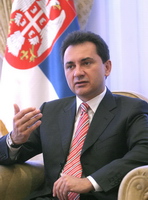Q:
A:
EU membership best way to fight for all Serbia’s interests
Belgrade,
30 January 2008
Serbian Deputy Prime Minister Bozidar Djelic stated that for the first time, Europe has finally and formally guaranteed EU entry to Serbia if that is its decision, and added Serbia now should demonstrate that it wants to join the EU.
In an interview for today’s edition of the Politika daily and on the occasion of Brussels’ offer to Belgrade to sign a political agreement with the EU, Djelic said that this is why he thinks that on February 3 a referendum will take place at which citizens will say whether they want to join the EU or not, adding that he expects to use his pen, with which he intends to sign the agreement with Europe, already on February 7.
I am convinced that on February 3 Serbia will give a mandate for a European Serbia to sign this agreement on February 7 and afterwards, when cooperation with the Hague Tribunal comes to an end, to sign the Stabilisation and Association Agreement (SAA) as well. We should then abolish the visa regime and acquire candidate status by year’s end so that Serbia could begin talks on EU accession as soon as March 2009.
The Serbian government’s official web site gives excerpts of the interview.
In what way does this political agreement differ from the SAA?
The SAA is primarily a commercial agreement, whereas this political agreement deals with the overall European future of our country. It has three important novelties. For the first time in history, the EU and the European Commission formally voted for Serbia to become an EU member once the conditions for that are fulfilled. This is our guarantee that we will join the EU.
What are the other two novelties?
The second is that besides the European Commission, all member countries are also in favour of visa abolishment. The third novelty is a clear message to young people and students who will be given greater support to study in EU countries. The EU will boost its financial support and help more students from Serbia to enrol at European universities.
The EU has often changed its promises and justified its decisions on account of events in Serbia:
On the contrary. There is a consistency on the EU’s part which sometimes even surprises some of us. I must say it is perfectly clear that the SAA has not yet been signed precisely because there is consistency on the part of certain countries, such as the Netherlands, who expect better cooperation with the Hague Tribunal. However, as for this agreement, faster EU integration naturally depends on the results of the presidential run-off on February 3.
Does the government’s authorisation for signing the SAA also apply to this EU proposal?
I am going to get the government’s authorisation for this agreement.
Which means that the government must commit itself again:
Naturally. I don’t expect any problems because this agreement is in our citizens’ utmost interests and I am certain that the government will recognise it in such an agreement.
Javier Solana stated that the decision on sending an EU mission to Kosovo-Metohija will be made a few days after the run-off in Serbia. Should Serbia sign the agreement even under such circumstances?
The resolution of the province’s status and our European future are two separate processes and they should be kept as such. That is in our country’s interest.
You believe that the two issues are definitely separate:
By offering us the political agreement, the EU has clearly given its word and guarantees that we will become an EU member and that is the best way to fight for all our interests, including Kosovo-Metohija.
If the EU sends a mission to Kosovo-Metohija and Ahtisaari’s plan comes into force, it will mean a seizure of a portion of Serbia’s territory:
Serbia thinks that the only possible legal way to send a new mission to Kosovo-Metohija is by way of a new UN Security Council resolution. The idea that we should reject the European future because of certain improbable, unfavourable decisions by some countries is detrimental to our national internets because it weakens our country, excludes us from the forums at which decisions are made and prevents us from attaining the full strength in all domains, including the defence of Kosovo-Metohija.
What will happen if the scenario which the EU wants does not come about?
The EU has simply made its stance crystal clear and it is up to Serbia to decide whether it wants to join the EU or not.
I am convinced that on February 3 Serbia will give a mandate for a European Serbia to sign this agreement on February 7 and afterwards, when cooperation with the Hague Tribunal comes to an end, to sign the Stabilisation and Association Agreement (SAA) as well. We should then abolish the visa regime and acquire candidate status by year’s end so that Serbia could begin talks on EU accession as soon as March 2009.
The Serbian government’s official web site gives excerpts of the interview.
In what way does this political agreement differ from the SAA?
The SAA is primarily a commercial agreement, whereas this political agreement deals with the overall European future of our country. It has three important novelties. For the first time in history, the EU and the European Commission formally voted for Serbia to become an EU member once the conditions for that are fulfilled. This is our guarantee that we will join the EU.
What are the other two novelties?
The second is that besides the European Commission, all member countries are also in favour of visa abolishment. The third novelty is a clear message to young people and students who will be given greater support to study in EU countries. The EU will boost its financial support and help more students from Serbia to enrol at European universities.
The EU has often changed its promises and justified its decisions on account of events in Serbia:
On the contrary. There is a consistency on the EU’s part which sometimes even surprises some of us. I must say it is perfectly clear that the SAA has not yet been signed precisely because there is consistency on the part of certain countries, such as the Netherlands, who expect better cooperation with the Hague Tribunal. However, as for this agreement, faster EU integration naturally depends on the results of the presidential run-off on February 3.
Does the government’s authorisation for signing the SAA also apply to this EU proposal?
I am going to get the government’s authorisation for this agreement.
Which means that the government must commit itself again:
Naturally. I don’t expect any problems because this agreement is in our citizens’ utmost interests and I am certain that the government will recognise it in such an agreement.
Javier Solana stated that the decision on sending an EU mission to Kosovo-Metohija will be made a few days after the run-off in Serbia. Should Serbia sign the agreement even under such circumstances?
The resolution of the province’s status and our European future are two separate processes and they should be kept as such. That is in our country’s interest.
You believe that the two issues are definitely separate:
By offering us the political agreement, the EU has clearly given its word and guarantees that we will become an EU member and that is the best way to fight for all our interests, including Kosovo-Metohija.
If the EU sends a mission to Kosovo-Metohija and Ahtisaari’s plan comes into force, it will mean a seizure of a portion of Serbia’s territory:
Serbia thinks that the only possible legal way to send a new mission to Kosovo-Metohija is by way of a new UN Security Council resolution. The idea that we should reject the European future because of certain improbable, unfavourable decisions by some countries is detrimental to our national internets because it weakens our country, excludes us from the forums at which decisions are made and prevents us from attaining the full strength in all domains, including the defence of Kosovo-Metohija.
What will happen if the scenario which the EU wants does not come about?
The EU has simply made its stance crystal clear and it is up to Serbia to decide whether it wants to join the EU or not.











